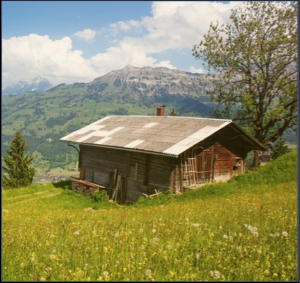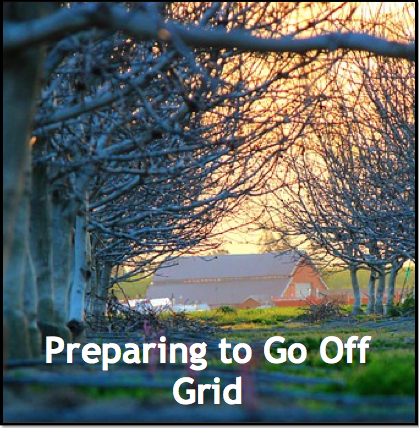Thousands of people dream of going off the grid, living in some idyllic cabin in the woods by streams, oceanfront, or nestled in the mountains. It makes for a lovely picture but the reality of preparing to go off grid requires considerable research, forethought, planning, and organization. Of course, to go ‘off grid’ means different things to different people.
No matter what your definition is for going off grid, what you’re essentially trying to do is create a little bubble of sorts. A place where just about everything you need is there at hand or can be obtained without having to go to the store. It sounds simple enough but getting that infrastructure in place is not exactly easy, nor is it cheap. You can do it inexpensively (there is no need to go out and buy a bunch of high dollar stuff but you will need to buy some things to build with), you can do it quickly, or you can do it right. The trouble is, you only get to choose two out of the three. Personally, I would prefer to do things inexpensively and right. Unless I have winter bearing down on me, there is no need to rush into things.
We plan on going off grid in 5-6 years. That gives us enough time to work on getting things researched, planned out, purchased, and in place. It also means we have time to get rid of a lot of things that just won’t fit in with our new lifestyle – like the microwave: it uses too much power. A blender isn’t exactly needed, nor is a waffle maker, just to give a few examples. To tackle such a large (and overwhelming) task, I broke things down for myself into 3 categories. Then, I broke the categories down into more manageable, bite sized chunks. It’s my sincere hope that those who think they can’t do it, or have no idea how, will read this and be able to use some or all of it to help them formulate their own plans to make their dreams to go off grid come true. This assumes you have land you either own or have permission to use/build on.
The Absolute Basics
- Shelter
- Food and Water
- Warmth
- The tools to maintain the basics (power?)
- Knowledge and practice
- Nest Egg / Backup plan
- The Right Mentality*
Every person on the planet needs food/water, shelter, and warmth. So, you need to ensure that you have those things going in. Yes, there are people who can take a pack of camping equipment, some hand tools, and head out to build everything they need. 99.9% of the population aren’t those kind of people. This article is for the 99.9% of the people.
This is the most crucial step to the whole plan. It’s your foundation to be able to go off grid and stay there.
If you know that winters are wet and cold, it’s probably not the best idea to plan on living in a canvas tent all winter long. Mold and never getting fully dry is enough to make even the most hardened off-gridder want to stay in a hotel. Be smart, be logical, and do your research. Anyone can go camping for a few days or even a month. Living year round like that is another matter.
For us, we will have a kit-style house either built already or at least on the property so it can be built before winter comes. We’ll have the tools we need to get firewood for the wood stove to keep us warm, heat water, cook with, etc. If we’re in our huge, 2 room hunting tent while building (I really love that thing!), we’ll use our tools to build a temporary kitchen shack and the stove will be in there! Water isn’t too much of an issue in a rainforest, just catch it off a roof or the tarp that’s hung up over your tent or camp area. It doesn’t have to be complicated to work out but be careful – it’s possible to go ‘too cheap’ and end up working harder and spending more to replace the generic supplies/tools/gear. I’ve already learned to not skimp on the quality of your tools.
Knowledge is all well and good but unless you have practiced the skills you need, food preservation methods, and using the tools to get the big job done, you are almost doomed to fail. Harsh, but true!
*If you go into this lifestyle knowing and expecting that things will go wrong, challenges will come up that may delay you, and that you will be challenged every.single.day to keep moving forward, your chances for success are much higher than those who think it’ll be no big deal to build up a homestead. When you expect the bad to come along while enjoying the good, it makes it easier to overcome!
Infrastructure Systems
Infrastructure is defined on dictionary.com as: “the basic, underlying framework or features of a system or organization.” In the absolute basics, you’ve already got the beginning of your systems. For long term though, you need to plan out what you need and how you’ll accomplish your goal. The water catch system above is fine and dandy for short term but 5 gallon water jugs won’t help much if there’s no rain for 2 weeks! Once you’ve gotten yourself at least on your land and temporarily set up, now it’s time to turn attention to longer term plans. These are things that you should already have figured out and planned/purchased before you even move!
- Long term shelter
- Water catch and storage
- Power
- Heat
- Garden and livestock areas
- Harvest preservation systems
 Though the list seems small, each item here is a big deal! The shelter, water catch, and heat go hand in hand. The gardens, livestock area, and then the place to preserve all of that bounty to get you through the winter is more complicated. There are a lot of details involved, especially if you aren’t just tossing everything into a freezer. If you don’t have a solid power source, chances are pretty good you aren’t going to rely on a freezer to preserve all your food. We plan on solar/wind power plus a backup generator to keep our batteries charged.
Though the list seems small, each item here is a big deal! The shelter, water catch, and heat go hand in hand. The gardens, livestock area, and then the place to preserve all of that bounty to get you through the winter is more complicated. There are a lot of details involved, especially if you aren’t just tossing everything into a freezer. If you don’t have a solid power source, chances are pretty good you aren’t going to rely on a freezer to preserve all your food. We plan on solar/wind power plus a backup generator to keep our batteries charged.
For us, once we get the basics set in place, the house will be worked on at the same time as the garden and livestock area.In my mind’s eye, I see an area separate from the main house where food is grown, harvested, and preserved. We plan on having the garden rather close to the chickens, with an enclosed chicken area running around the border of the garden as a way for them to do some pest control, lower the food bill some, and get some exercise. There are A LOT of bald eagles on the island we want to move to; free range chickens are a guaranteed way to lose birds.
The kitchen shack built in the first phase will be turned into a garden processing and canning area. Water bath canning over a fire outside and a propane stove inside for pressure canning along with all the canning supplies on shelves. With a water catch system of its own, this will be the perfect place to rinse and prepare everything to be canned up. There will also be a smoker out back somewhere because we absolutely love smoking meats and cheeses. We use a small electric smoker for now but when we move, we will build a more traditional smoker.
Maintenance and the Unexpected
The first two phases will take about a year, in my opinion, before you really have your cycle going. Of course, the work never ends but things do tend to get less frantic on the second year. The first is spent getting everything set up, systems in place, and schedules figured out. Of course, you’ll never be ‘done’ improving your situation but at least now, you can take a breather now and then. Instead of slaving away in the wood shop, head out fishing instead. It’s fun, relaxing and exciting at the same time and with luck, you’ll bring home fresh fish to increase your winter stock.
Even though everything is ‘new,’ there is still maintenance that needs to be done. If you haven’t planned for it, you may be in for a nasty surprise. Planning for it is making sure you have backups, alternatives, and hopefully some kind of nest egg. No one can do it all on their own, not really. Even the pioneers went to the “Trading Post” to get the things they couldn’t produce themselves. Having a cushion or backup plan to help deal with the unexpected goes a long way to ensuring peace of mind. When you know you’ve got some wiggle room, life is easier overall and you can enjoy more of it instead of worrying over every little detail.
Articles on Things We’ve Done to Prepare for Going Off-Grid
-
Preparing to Live a Homestead Life
-
Lessons Learned from Long Camping Trips
-
You’re Not Really a Prepper Unless you Practice




